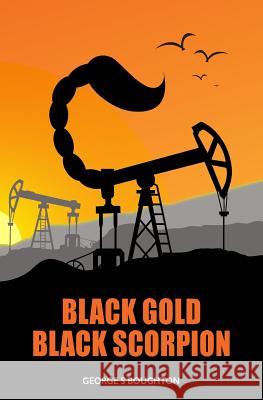Black Gold - Black Scorpion » książka
Black Gold - Black Scorpion
ISBN-13: 9780993275609 / Angielski / Miękka / 2015 / 144 str.
Stern Magazine, the Black Scorpion: "we will aim at everything - even if it is not moving"The Biafran war began in 1967 and ended in 1970. Now, fifty years on, Black Gold Black Scorpion couldn't be timelier.SURREY LIFE magazine: "George S Boughton was an oil engineer in Nigeria during the 1967 to 1970 Biafran war and what emerges from this intense, emotional memoir is a withering indictment of governing elites and the destructive consequences of their out-of-control behaviour. Around a million people starved to death or were killed in the fighting; yet the news vacuum meant that Boughton and other expat workers were often in the dark about the true extent of what was going on.
Black Gold Black Scorpion is a fascinating, first-hand account of how a nation at war with itself became a magnet for cold war politics as it sank into moral darkness."
The memoir recounts the lives of a young oil engineer, his wife and newborn child, during the Biafran War, when they inadvertently lived through one of the worst episodes of African history, experiencing first hand a life to which the international media initially had no access.
Working in an industry that has gone on to pollute massively with oil, theirs is a different story of Africa, oil and aid during a conflict that cost over a million lives.
The author also describes the political elites and those, like Ojukwu and Adekunle, who fought them - having himself been captured and detained, one to one, by the mythically ruthless Black Scorpion; this, the strangest of events, enabling him to observe at close range the disintegration of a powerful personality.
This is a different story of Africa and aid during a conflict that cost over a million lives. Black Gold - Black Scorpion closes with the overthrow of Nigeria's government, the demise of industry and European interests, and the start of massive oil pollution and corruption.
More especially, the author's and his family's interaction with the people of the area, the people of Igboland, serves to underline how most of Africa continues to be let down by the pillars of the modern world - political elites, capitalists, the media and warring world powers.
Stern Magazine, the Black Scorpion: "we will aim at everything - even if it is not moving"The Biafran war began in 1967 and ended in 1970. Now, fifty years on, Black Gold Black Scorpion couldn't be timelier.SURREY LIFE magazine: "George S Boughton was an oil engineer in Nigeria during the 1967 to 1970 Biafran war and what emerges from this intense, emotional memoir is a withering indictment of governing elites and the destructive consequences of their out-of-control behaviour. Around a million people starved to death or were killed in the fighting; yet the news vacuum meant that Boughton and other expat workers were often in the dark about the true extent of what was going on.
Black Gold Black Scorpion is a fascinating, first-hand account of how a nation at war with itself became a magnet for cold war politics as it sank into moral darkness."
The memoir recounts the lives of a young oil engineer, his wife and newborn child, during the Biafran War, when they inadvertently lived through one of the worst episodes of African history, experiencing first hand a life to which the international media initially had no access.
Working in an industry that has gone on to pollute massively with oil, theirs is a different story of Africa, oil and aid during a conflict that cost over a million lives.
The author also describes the political elites and those, like Ojukwu and Adekunle, who fought them – having himself been captured and detained, one to one, by the mythically ruthless Black Scorpion; this, the strangest of events, enabling him to observe at close range the disintegration of a powerful personality.
This is a different story of Africa and aid during a conflict that cost over a million lives. Black Gold - Black Scorpion closes with the overthrow of Nigeria's government, the demise of industry and European interests, and the start of massive oil pollution and corruption.
More especially, the author's and his family's interaction with the people of the area, the people of Igboland, serves to underline how most of Africa continues to be let down by the pillars of the modern world – political elites, capitalists, the media and warring world powers.











